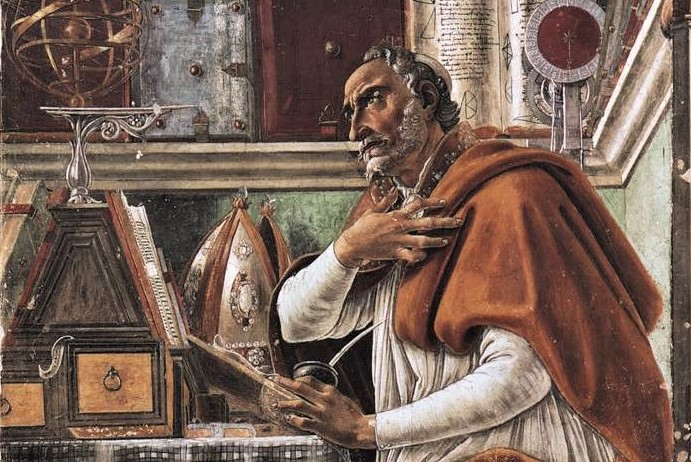Msgr. Charles Pope: St. Augustine on Suffering as a Medicine

Abp. Samuel J. Aquila: New Pastoral Note by Denver Archbishop Highlights ‘Clearest Teaching on the Eucharist’ in Scripture
August 5, 2023
Fr. Mark Beard, Beloved Louisiana Priest, Dies in Car Crash, by Anthony Iafrate
August 5, 2023
Augustine-Botticelli
By Msgr. Charles Pope, Aug. 4, 2023
St. Paul in today’s Office of Readings (17th Week Friday) speaks of his learning to accept certain sufferings as a mysterious working of God’s providence. It put me in mind of another passage I read recently from St. Augustine. We can ponder his teaching on suffering and its role in preserving us from something far worse.
When asked, most people identify their most serious problems as those related to their physical health or their finances; family and career are also often mentioned.
Frankly, our biggest problem is pride and all the sins that flow from it. Nothing is more serious than our sins, which can destroy us forever. Worldly problems are temporary. They can make life unpleasant or at worst kill us, but then we get to go home and meet God if we are faithful.
Therefore, to God, our most serious problem is our sin. This is well-illustrated in the Gospels, when a paralyzed man was presented to Jesus: Jesus looked at him and said, “Your sins are forgiven.” Yes, Jesus looked at a paralyzed man and saw his sin as his most serious problem and the one to be dealt with first.
We don’t think like this even when taught that we should.
Because pride and the sins that flow from it are so serious, we do well to ponder how God permits suffering in our life so as to keep us from becoming too prideful. To God, it is better that we suffer some here, learn humility, and be saved, than to remain prideful and go to Hell.
I have received gifts and blessings, but if it weren’t for some suffering and humiliation in my life, I’d be so proud I’d go right to Hell. There’s just something about suffering that can keep us humble and continually calling on God.
St. Augustine reflects on this in what is considered his greatest work, The City of God. It was occasioned by the decline of the Roman Empire and the sacking of the city of Rome by the Barbarians under Alaric in 410 A.D. Augustine wrote the work to ponder how a once-mighty empire had fallen into such decay.
There were of course many sufferings inflicted on the citizens of Rome by the Barbarians. “Sackings” are not pleasant. Some people were killed, many women were raped, grave damage was inflicted on the city, and much personal property was damaged and/or taken.
In chapter 28 of Book 1 of the City of God, Augustine ponders why God would have allowed such suffering, especially to the Christians of that city, and in particular to the Christian women of virtue who were raped.
At times, his reflections seem almost unsympathetic, but in effect St. Augustine points to humiliation and suffering as a strong but necessary medicine for pride, which is far worse than any of the ills suffered to remedy it.
St. Augustine begins by disclaiming any ability to offer a complete explanation for suffering:
If you ask me why they [the Barbarians] were allowed the liberty of committing these sins, the answer is that the providence of the Creator and Ruler of the world transcends human reckoning, and that “incomprehensible are his judgments … unsearchable his ways.
Augustine then adds (somewhat boldly) to those in Rome who suffered,
Nevertheless, carefully scrutinize your own souls and see whether you were not unduly puffed up about your virtue.
He then ponders,
They [those who suffered] may possibly have in them some latent weakness which could have swollen to overwhelming pride had they escaped this humiliation…. So violence snatched something away from them lest prosperity should endanger them.
He goes on to conclude,
But they learned humility …. And were delivered from a pride that had already overtaken them … a pride that threatened them.
What of us who have suffered? We ought not to exclude the possibility, even the likelihood, that such suffering is permitted by God in order to humble us and keep us from the far worse of pride.
We must also conclude that when God allows suffering for this purpose He also gives grace to help us avoid extreme anger or despair. St. Augustine concludes his reflection in this way:
God would never have permitted these evils if they could destroy in his saints that purity of soul which he had bestowed on them and delights to see in them.
Reflections such as these do not generally please modern ears. We do not usually like the notion that God permits suffering for some greater good. Too easily we call Him unfair and harsh for doing such a thing. We prefer to think of Him as a doting grandfather rather than the disciplining Father described in Hebrews 12:4ff.
Our dismissal of suffering as a medicine is largely because we fail to see just how serious a sin pride is. We are dismissive of the tremendous toll that sin takes on us and the extreme danger that it causes in our hearts. Hence, we reject any medicine at all, let alone any strong one. However, God will not spare us merely to please us if in so doing He would lose us.
Suffering is complex and mysterious. That God permits it cannot be explained easily, but as St. Augustine makes clear, we ought not to overlook its salutary effect through the humility it engenders.
That, in and of itself, is a very good thing; for pride is our worst enemy.
This song, translated from the Latin, says,
Sadness and anxiety
have overtaken my inmost being.
My heart is made sorrowful in mourning,
my eyes are become dim.
Woe is me, for I have sinned.
But you, Lord,
who does not forsake
those who hope in you,
comfort and help me
for your holy name’s sake,
and have mercy on me.




